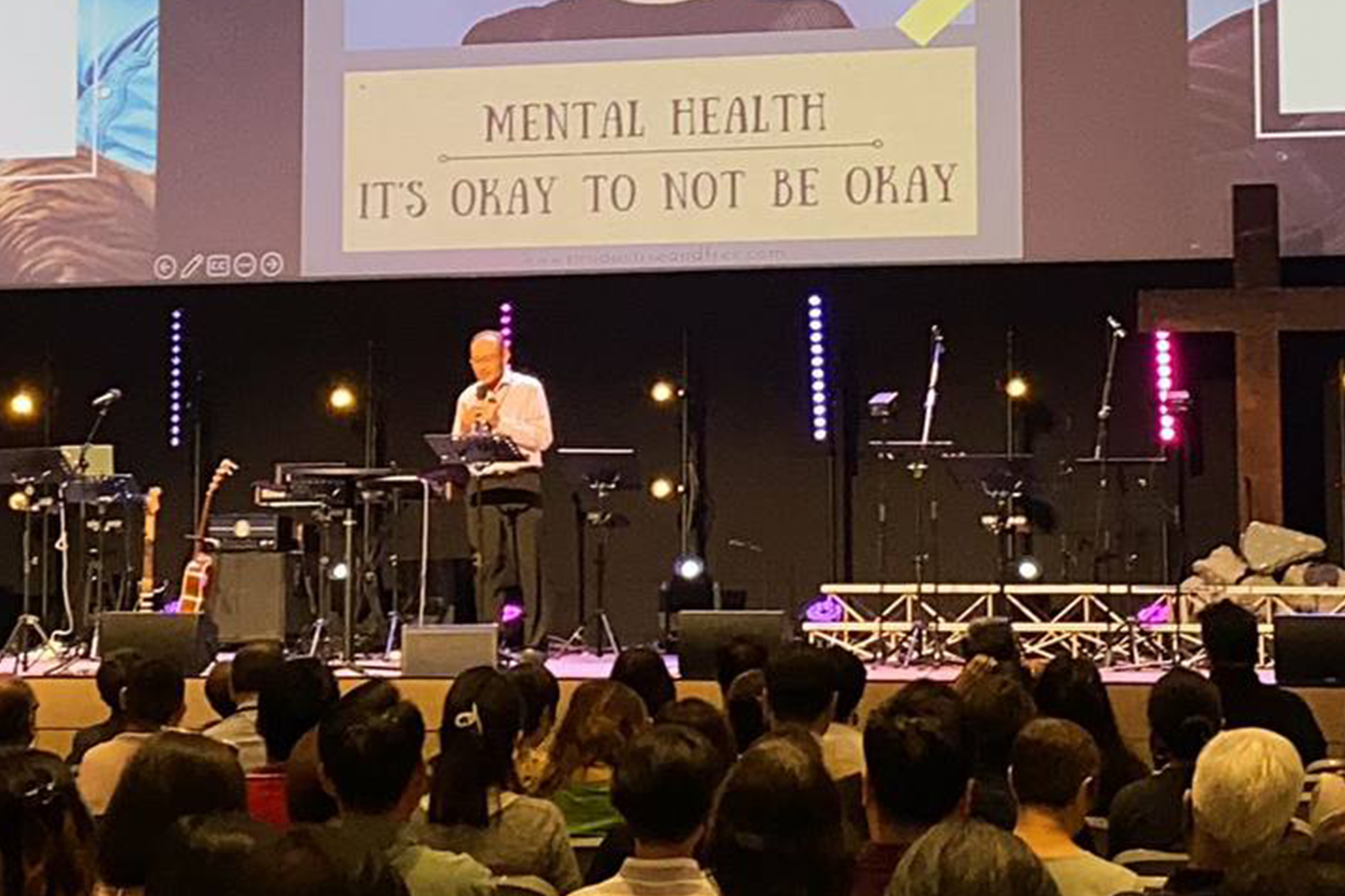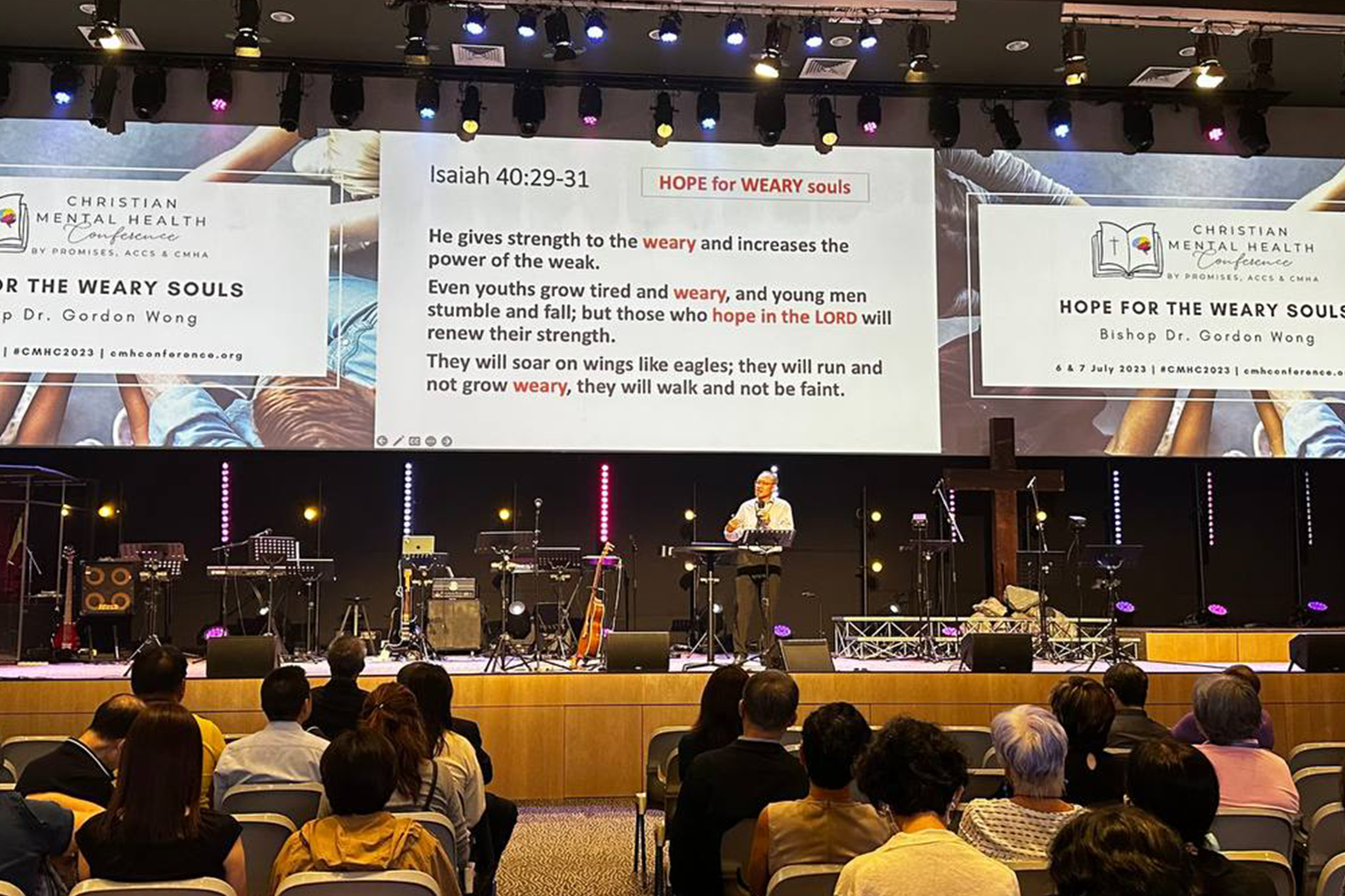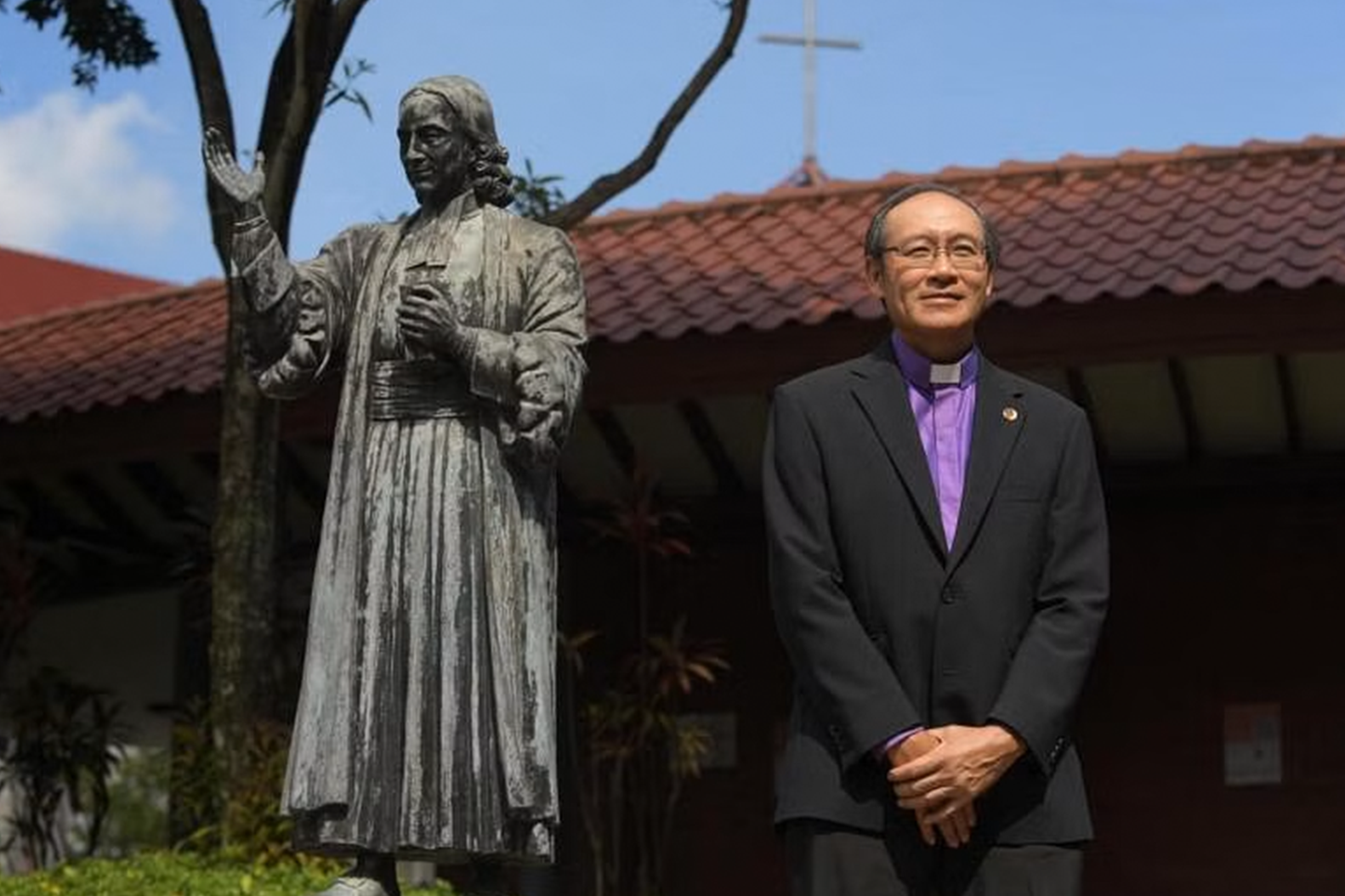Delivering the keynote message on the first day of Christian Mental Health Conference 2023, Bishop Dr. GORDON WONG took us on a deep dive into Isaiah 40 and offered a quite different take on the chapter.
Below, we’ve adapted his message on how God renews our strength for the daily valleys of life that we all must someday walk through.

When I thought about the phrase “hope for weary souls”, I almost immediately thought about the Lord Jesus’ words in Matthew 11.
Come to me, all you who are weary and heavy laden, and I will give you rest, you will find rest for your souls.
But then I also thought of a passage in Isaiah 40, where we have not just the word “weary”, but also the phrase “hope in the Lord”.
And so I speak mainly from Isaiah chapter 40, and I’ll end by reminding us that Isaiah’s words are actually repeated in the promise of our Lord, to all who are weary and need to find grace for their soul.
Wearily, wearily…
Let me turn to Isaiah 40, a passage with both words “hope” and “weary”. They occur in Isaiah 40:29-31:
“He gives strength to the weary and increases the power of the weak. Even youths grow tired and weary, and young men stumble and fall; but those who hope in the Lord will renew their strength. They will soar on wings like eagles; they will run and not grow weary, they will walk and not be faint.”
Some of you may be more familiar with the translation “wait on the Lord” in verse 31. This is certainly correct, but to wait on the Lord is to keep expecting and hoping for the promises of God to be fulfilled. This is why many Bible translations use the phrase “hope in the Lord”.
Did you also notice the repeated use of the word weary, not just once or twice, but three times in these three verses?
Weary, weary, weary. There are many different things in life which can make the best of us weary. Global events, endemics, famine, floods, fires, and also personal and local situations can sap our energy physically, emotionally and spiritually.
A loved one suddenly falls ill or passes away; we get dismissed and laid off; our children get into trouble; an accident presents us with worrying bills… many things can make us weary.
Isaiah 40 is a very long chapter and it presents several different reasons why people back then could become weary and tired, feeling helpless and not hopeful for the future.
Punctuation matters!
Let me highlight one of the reasons why pastors or the prophet himself back in the days of Isaiah 40, was feeling weary, and hopeless. We go back to Isaiah 40:6-8 (NIV):
A voice says, “Cry out.”
And I said, “What shall I cry?”
“All people are like grass,
and all their faithfulness is like the flowers of the field.
The grass withers and the flowers fall,
because the breath of the Lord blows on them.
Surely the people are grass.
The grass withers and the flowers fall,
but the word of our God endures forever.”
Let me expand these verses by telling you something about the punctuation system in ancient Hebrew: ancient biblical manuscripts did not use punctuation marks.
There were no commas, no full stops, no open and closed quotation marks. This is one of the many reasons why Bible scholars will sometimes interpret certain verses differently.
This is true of verses 6-8 in Isaiah 40. Most of our English translations punctuate it the way the NIV does: “A voice says, cry out. And I replied, What shall I cry?”
Note the close quotation marks after that, and then a new set of open quotation marks to convey, presumably, the answer from the heavenly voice.
The heavenly voice’s answer is, all people are like grass and all their faithfulness is like the flowers of the field. And then the close quotation marks come at the end of verse eight.
This punctuation is possible, but it is probably wrong.
There should not be a closed quotation mark here. The NIV put in close quotation marks too early; the prophet has not yet stopped speaking.
What difference does this punctuation make? In the NIV and most of our English translations, we are given a picture of a heavenly voice telling the prophet to cry out or proclaim a message.
And then, the ever ready and willing prophet replies by asking, what shall I cry out? Here I am, tell me and I will preach it, close quotation mark.
Then follows the answer from the heavenly voice, open quotation mark, this is what you want to cry or preach: all people are like grass…

But in the way that I think it should be punctuated, we do not see a happy and willing prophet who is all ready to obey the commission to preach.
Instead, in response to the divine call to cry out or proclaim God’s word, the prophet’s reply is not the happy, willing response that says, “Here I am, Lord, what do you want me to cry out? Tell me and I’ll preach it.”
No, instead, we hear a prophet whose response is sad and discouraged – maybe even a little cynical. Certainly, the reply of a prophet who was feeling weary:
Cry out? What shall I cry? All people are like grass, and their faithfulness, the glory, the beauty are just like the flowers of the field. We all know that grass and flowers fade away. Grass withers, flowers fade. The Lord’s breath just dries them up and blows them all away. You ask me to proclaim Your word? What shall I cry? What should I proclaim? What’s the use?
I preach, but nothing of lasting value seems to take place. Sometimes, I see people respond so positively. They come forward at the altar call. They rededicate themselves at the annual church camp. Their faithfulness looks so beautiful and inspiring, but it never seems to last. The beauty and the glory of their faithfulness, they are just like beautiful flowers that fade and grass that withers away.
You tell me to cry out, to preach. Preach what? What’s the point? It doesn’t bring any lasting change in the world. Grass withers and flowers fade, just like human faithfulness.
Now, why did I bore you with all this technical punctuation and information?
I want you to understand that the prophet here was feeling very weary, tired of preaching and pastoring. Disillusioned, maybe even a little depressed.
What was the point of carrying on pastoring and preaching the word of God to people when it didn’t seem to produce any lasting results?
Pastors, I hope you have never felt this despair. But I wouldn’t be surprised if you haven’t.
I wonder whether any of you have ever felt like that. I have.
The people we pastor, our friends, our fellow church leaders, their faithfulness and support… it’s all so beautiful and glorious, but it never seems to last.
The work we do, the sermons we preach, the programs we start – in the end, they all seem to fade and wither away.
You change church or change service, and five months later, you find out that what you tried to establish in your previous congregation is done away with.
Pastors, I hope you have never felt this despair. But I wouldn’t be surprised if you haven’t.
Most pastors experience this sense of weariness and despair at some point or another, just as God’s great prophet here in Isaiah 40.
But it isn’t just pastors who feel this weariness. Anyone, everyone – even mental health care professionals. You try to do something good, and sometimes you will see that all your good efforts have come to nothing.
Even parents do this. We teach our children good values and habits. When they get older, they become adults and they seem to rebel against all these godly values which we tried our best to instil.
Sometimes, like the prophet Isaiah 40, we may feel discouraged and disillusioned. All his prophetic preaching seems to amount to nothing. In the end, everything has blown away like withered grass and wilted flowers.
Thank God, that the despair of the prophet here in Isaiah 40 did not turn into cynicism! If it had, we might never have received the comforting words of life in this book that we call Isaiah.
So how, how did God save this prophet from cynicism? How did God guide this weary prophet through his despair?
Your calling is about God’s Word
Look again at the last line of verse seven; the new open quotation mark should be placed here.
Yes, indeed. You may be right that people are just like grass that withers. You may be right about people.
The first part of God’s answer surprises me. You know, if a pastor came up and told me that he was feeling weary and discouraged because his ministry seemed to be producing no lasting results, I would have tried to cheer him up.
I would have said something like, “Don’t be so hard on yourself. You may not be able to see the results but people have been blessed and changed. Don’t be so harsh on them or on yourself. One day, you will see how your work has borne good fruit in their lives. Your labour is not in vain in the Lord.”

But that is not how God chooses to speak here in Isaiah 40.
Instead, God agrees with the weary prophet: you may be right about people being just like grass that withers, like flowers that fade, but – and this is a very important but – the word of God endures forever.
You may be right about people, but your calling is about God’s word.
And remember, God’s word endures forever. It does not fade away like flowers and grass. Your calling is about preaching God’s enduring word.
What might this mean? It means that we should not worry too much about human results or human achievements.
There are deliberate echoes between Isaiah 40 and Isaiah 6. In other words, God wants the reader of Isaiah 40 to remember what God had earlier said in Isaiah 6.
Right near the start of his calling, Isaiah was warned that he would be proclaiming God’s word to people who would not seem to hear, who would not be really interested in listening.
Isaiah was called to show them God’s love, but was warned that the people might seem to see, but they would not really see or understand.
And so, Isaiah should not focus on some human key performance indicators or visible results.
Isaiah was not called to produce human success and results. He was called to proclaim faithfully, the divine, enduring word of God.
Visible human results and human achievements, as glorious and beautiful as they may seem, will often be like grass that withers or flowers that fade.
Yes, indeed, the faithfulness and beauty of all flesh is like grass.
And so we must not allow ourselves to be inspired by, or to be discouraged by, how much or how little of a lasting difference we make, or do not make, in the lives of people in our world.
Don’t be driven by a desire to build a church of people whose faithfulness to God will shine bright forever.
Don’t misunderstand me, that’s a worthy goal. But as worthy a goal as that may be, do not be driven by it. That must not be our focus.

What should our focus be on then? It should be on that which will truly last forever. Something that will not fade like grass, or wither like flowers in the sun, something that will endure forever.
And what will endure forever? The answer is in verse eight. Indeed, the grass may wither, the flowers may fade – but the word of our God stands forever.
But Gordan, you may ask, what does this mean in practical terms? I think this offers us many different practical applications.
But since I want to hurry on to the verses at the end of Isaiah 40, let me just suggest one practical application.
Preach faith until you find it
After serving years as a professional pastor in England, and then returning after a few years of overseas missionary work in America, John Wesley had become weary and tired.
His mission and his preaching in America seemed to have been a total failure, producing no visible lasting conversions or results.
He was discouraged, and he felt like giving up, he even wondered whether he had any more true faith in God. He felt like a hypocrite, he thought he should quit preaching.
How can I preach faith when I’m not sure if I have faith? How can I preach God’s love, if I’m not sure in my heart that God really loves me?
Wesley asked a friend, Peter Boehler, whether he thought Wesley should stop preaching. “By no means,” said his friend.
“But what can I preach if I’m feeling so lacking in faith, what can I preach?” asked Wesley.
And Peter Boehler replied, “Preach faith until you find it. Then because you find it, you will preach faith.”
So Wesley did not give up, he kept on faithfully preaching. Not preaching human faith, but preaching God’s Word.
Preaching to others, and to himself, to keep hoping and keeping faith in the word of God, which endures forever.

And this is what Isaiah 40:29-31 urges us also to keep doing when we are feeling weary, weary and weary.
It isn’t just seasoned old pastors like John Wesley who become weary. Even youth can grow tired and weary; young men stumble and fall.
But there is hope for the weary. There is hope if we can keep on waiting, keep on believing, keep on hanging on, keep on hoping in the promises of God’s Word.
And here is one of those divine promises, it’s the promise of new strength for the weary. And the promise is repeated to make sure we hear it.
Verse 29, God gives strength to the weary. Verse 31, those who hope in the Lord will renew their strength.
Now the pronoun in NIV’s translation of verse 31, is they will renew their strength. I think it’s slightly misleading. We should delete the pronoun “their”.
The Hebrew doesn’t include the pronoun, it reads simply that they will change or exchange strength.
God here is not saying that He will renew their normal human strength which has become weary. Human strength is a good thing, but it always gets weary. Like grass, it will fade away.
God here promises us a new type of strength. In fact, the Hebrew verb is one which means to change or to exchange.
God is offering them an exchange. A change in strength, a new strength, a divine strength, in exchange for our fading human strength.
They had hope in the Lord. He would change their strength, and they would receive divine strength from God.
Those who hope in the Lord will renew, will exchange strength for a new strength, God’s strength.
Soar, run, walk…
“But even as hope died in Sam, or seemed to die, it was turned to a new strength.” (J.R.R. Tolkien, The Return of the King)
Now, it has been noticed that the sequence of words in verse 31 seems a bit anticlimactic. They will soar on wings like eagles, they will run and not be weary, they will walk and not be faint.
Some smart alec quipped that the sequence here progresses to a dead stop: they will soar on wings, they will run and not be weary, they will walk and not be faint.
What’s next, they will lie down and never get up?
Wouldn’t it be even more inspiring in the sequence had it been reversed? They will walk, no, they will run! No, they will soar!
Personally though, I find the so-called “descending sequence” to be more meaningful and helpful for me.
We need new strength, God’s strength, not just to soar and fly over the dark valleys and trials of everyday life.
We would love to be able to fly, or run quickly over every obstacle that pops up to block our way.
And sometimes when we speak to God, we do find strength to get through the bog and the mire quickly and smoothly. But only sometimes.
Life’s challenges often require us to walk through them.
Many other times, life with its daily challenges does not let us run past them or fly over them so quickly.
Life’s challenges often require us to walk through them. To walk in them not quickly, but slowly, avoiding the many potholes and pitfalls.
And perhaps walking through the mundane and oftentimes monotonous journey of everyday life requires more strength, more stamina, more energy, than the exciting flying over or running along the highs of mountain peaks.
In any case, may all weary souls hope in the Lord. May we find God’s new strength to help us go on.
God gives grace
Let me end by sharing an old poem. This poem was written by Annie Johnson Flint, who also suffered many bouts of weariness and despair in her life.
Annie lived most of her 66 years on earth in much suffering and pain, physical pain but often also depressing, social pain, emotional pain.
Her mother died when she was only three years old. Her father died just before she turned seven years old. Pause to consider how terribly depressing it is, for a seven year old to face life without any loving parents.
And then when she turned 16 – for many people, sweet 16 – life turned even more sour for her. At this sweet young age, Annie’s body began to break down physically with what we would describe as severe arthritis.
Those who hope in the Lord will renew, will exchange their strength for God’s strength.
By the time she was 20, she could no longer walk. She also suffered the frequent embarrassment of incontinence, unable to control her bowel movements.
Her body deteriorated, becoming twisted and deformed by rheumatoid arthritis. And then cancer struck, weakening her body system even further.
She was incapacitated, bedridden for so long, yet the title of her biography is full of hope. It’s entitled The Making of The Beautiful.
Annie’s testimony is that despite the weariness and the darkness of endless day-to-day suffering, God’s strength and grace helped her walk through the almost daily valleys of despair and hopelessness.
Jesus gives rest to the weary soul
Listen to one of her poems and marvel at the grace of God, the divine strength that enabled her to say in the midst of pain:
God giveth more grace, when the burdens grow greater,
He sendeth us more strength as our labors increase;
To addeth afflictions He addeth his mercy,
To multiplied trials He multiplies peace
Think of the many mornings and evenings, when the pain must have made her weary of living. And then listen to her say:
When we have exhausted our store of endurance,
When our strength has failed, ere the day is half done,
When we reach the end of our hoarded resources,
Our father’s full giving is only begun is Love
His love has no limits, His Grace has no measure,
His power has no boundary known unto men;
For out of His infinite riches in Jesus
He giveth, and giveth, and giveth again.
Those who hope in the Lord will renew, or will exchange, their strength for God’s strength.
Annie Johnson received that divine strength, as day by day she put her hope in God and in His word that endures forever.
May God help us weary souls, all of us, to wait and hope in the Lord, who says to us all: come unto me, all who are weary and heavy laden, and I will give you rest, rest for your weary souls. Amen.
This article was adapted from the keynote message Bishop Dr. Gordon Goh delivered on Day 1 of Christian Mental Health Conference 2023.
- What is the most difficult thing you are walking through in this moment?
- What is one promise of God in His Word that you can stand upon?
- Who is one friend you can call on and depend for help at 2am?
- Thank this friend for being in your life, and offer to do the same for him.









